|
|
|
Sort Order |
|
|
|
Items / Page
|
|
|
|
|
|
|
| Srl | Item |
| 1 |
ID:
171246
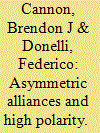

|
|
|
|
|
| Summary/Abstract |
The Middle East and the Horn of Africa exist in two distinct regional security complexes (RSCs), groupings of states exhibiting intense security interdependence within a distinct region, but rarely between regions. Recent geopolitical changes and related analyses, however, point to either a subsuming or a joining of the two RSCs, potentially leading to a high degree of uncertainty in two conflict-prone regions. Given the importance of such developments, we question this theory of RSC expansion by offering a concise review of recent security interactions between the two RSCs as well as quantitatively and qualitatively measuring the material power capabilities of relevant states. Borrowing from and contributing to RSC theory, we also identify and analyse concepts and indicators such as threat perception and sub-regional alliances. Our findings demonstrate the Middle East RSC is not expanding to include that of the Horn of Africa. The two remain distinct and under internal consolidation, despite the current discourse. Rather, high polarity in the Middle East coupled with often-congruent interests in Horn of Africa states best explains the current pattern of their interaction, particularly as Middle East states pursue strategies that further their own security interests at the expense of rival states within their own RSC.
|
|
|
|
|
|
|
|
|
|
|
|
|
|
|
|
| 2 |
ID:
178737
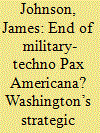

|
|
|
|
|
| Summary/Abstract |
This article uses the international relations (IR) ‘polarity’ concept as a lens to view the shifting great power dynamics in artificial intelligence (AI) and related enabling technologies. The article describes how and why great power competition is mounting in within several interrelated dual-use technological fields; why these innovations are considered by Washington to be strategically vital, and how (and to what end) the United States is responding to the perceived challenge posed by China to its technological hegemony. The following questions addressed in this paper fill a gap in the existing literature: Will the increasingly competitive U.S.-China relationship dominate world politics creating a new bipolar world order, as opposed to a multipolar one? Why does the U.S. view China’s progress in dual-use AI as a threat to its first-mover advantage? How might the U.S. respond to this perceived threat?
|
|
|
|
|
|
|
|
|
|
|
|
|
|
|
|
| 3 |
ID:
094560
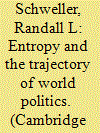

|
|
|
|
|
| Publication |
2010.
|
| Summary/Abstract |
The random and indeterminate nature of the current unipolar world suggests a condition of increasing entropy. There are two reasons for this claim. First, relative capability advantages under unipolarity do not translate as easily as they once did into power and influence over others. Second, systemic constraint is a property that limits actors' freedom of action by imposing costs and benefits on certain kinds of actions. Unlike past multipolar and bipolar systems, the current unipolar system exerts only weak, if any, systemic constraints on the unipolar power and all other actors as well. Thus, polarity has become a largely meaningless concept. Today, system process rather than structure best explains international politics, and this process is one of entropy. Finally, I suggest two pathways from unipolarity to a more balanced system: one is fairly consistent with standard balance-of-power realism but adds an ideational component; the other restores equilibrium by means of entropy.
|
|
|
|
|
|
|
|
|
|
|
|
|
|
|
|
| 4 |
ID:
151644
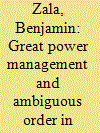

|
|
|
|
|
| Summary/Abstract |
This article considers what the nineteenth century can tell us about the nature of great power management under conditions of ambiguity in relation to the holders of great power status. It charts the development of an institutionalised role for the great powers as managers of international society but with a specific focus on the mutual recognition, and conferral, of status. Such a focus highlights the changing, and sometimes competing, perceptions of not only which states should be thought of as great powers, but also therefore whether the power structure of international society remained multipolar or shifted towards bipolarity or even unipolarity. The article argues that a ‘golden age’ of great power management existed during a period in which perceptions of great power status were in fact more fluid than the standard literature accounts for. This means that predictions surrounding the imminent demise of the social institution of great power management under an increasingly ambiguous interstate order today may well be misplaced.
|
|
|
|
|
|
|
|
|
|
|
|
|
|
|
|
| 5 |
ID:
110201
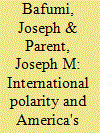

|
|
|
|
|
| Publication |
2012.
|
| Summary/Abstract |
There is a growing consensus that the United States is undergoing a period of political polarization, particularly among elites. The causes of this polarization remain under-researched. We argue that shifts in the international distribution of power influence America's polarization. To demonstrate the argument, this article analyzes changes in power and polarization quantitatively and qualitatively from 1945 to 2005. A key finding is that greater relative power on the world stage substantially increases polarization and some of its correlates, like income inequality. The argument also measures the extent of international influence on domestic polarization and makes novel predictions on when and why polarization will fall.
|
|
|
|
|
|
|
|
|
|
|
|
|
|
|
|
| 6 |
ID:
187373
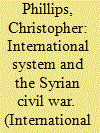

|
|
|
|
|
| Summary/Abstract |
How does the international system impact a civil war? Does polarity affect the war’s outbreak, character and how long it lasts? Systemic Realists argue multipolarity makes inter-state war more likely, but is this also true of intra-state war? Using the Syria conflict (2011-present) as a case study, this article suggests a connection can be found. It argues that the end of US-dominated unipolarity, and its interaction with a new multipolarity in the Middle East region impacted the behaviour and calculations of foreign states involved, contributing to the outbreak of war and how it progressed. The same interacting multipolarity paradoxically also shaped Russia’s decision to intervene in 2015, ultimately edging the war towards a conclusion, something that Systemic Realists would not expect. This study of the systemic effects in the Syria conflict suggests that the Neo-Realist concept of polarity continues to have relevance and can be useful in understanding intra- as well as inter-state conflict. It points to the importance of the interaction between regional and global systems in generating these effects, and it suggests a reconsideration of the Neo-Realist view that multipolarity always makes wars harder to end.
|
|
|
|
|
|
|
|
|
|
|
|
|
|
|
|
| 7 |
ID:
152707


|
|
|
|
|
| Summary/Abstract |
The literature on the current global order is confused over its polarity. Depictions of a current multipolarity are found alongside discussions of the longevity of US-led unipolarity, while others point to the early stages of US–Sino-dominated bipolarity. These competing visions of the interstate order sit uneasily within the existing literature that both defines polarity in terms of the distribution of material capabilities and makes system-level predictions based on the assumption that all actors perceive polarity objectively. This article outlines the need for a more analytically eclectic understanding of polarity. Exploring the possibilities of a deeper engagement between the realist literature on structural power and the constructivist literature on perception, agency, and performativity, it puts forward a redefinition of polarity in which perceptions of status replace a focus on the distribution of capabilities. An analysis of the Cold War period—normally depicted as a clear case of unbroken bipolarity—demonstrates the usefulness of this reconceptualization.
|
|
|
|
|
|
|
|
|
|
|
|
|
|
|
|
| 8 |
ID:
167456


|
|
|
|
|
| Summary/Abstract |
What do UK policymakers mean when they say that Britain’s strategic environment is returning to “multipolarity”? In realist international theory, polarity is a specific causal concept; the number of powers capable of balancing even the most capable other state(s) in the international system (“poles”) is taken to determine the system’s stability. Does the post-2017 appearance of polarity references in British security policy documents therefore reflect some unexpected UK renaissance of realist thought? Or is something else going on, as recent work by Ben Zala suggests? This article will demonstrate that, while UK official usage of the “multip–” word has indeed flourished recently, the term is actually being used in a more elastic, less bounded way than realism prescribes in order to generate other kinds of political effect. Specifically, “polarity” (and its “multi-” prefix) is used to characterise the behaviour of those major states that oppose Western-preferred international order, to elide Britain’s own relative power/status tensions, and to capture an expansive laundry-list of perceived international dangers. The article then discusses five ways in which a shift in polarity could negatively affect Britain; important consequences that merit preparatory contemplation, yet that an imprecise, catch-all understanding of “multipolarity” too readily obscures.
|
|
|
|
|
|
|
|
|
|
|
|
|
|
|
|
| 9 |
ID:
156241


|
|
|
|
|
| Summary/Abstract |
This article examines the hedging strategies of Iran, Russia, and China. It demonstrates how these deeply dissatisfied states have used strategic hedging to pursue status and security: specifically, through local revisionism that does not jeopardize their ability to participate in the international system or trigger interstate war. The case studies show how these states have maintained this balance during three of the biggest interstate crises of the twenty-first century so far: confrontations over Iran's nuclear program, Russia's destabilization of Ukraine, and China's maritime operations. Each case juxtaposes these states΄ regional assertion of power with their efforts to bargain with the system hegemon. The evidence shows that despite ostensibly revisionist maneuvers, none of these states want to fight the US or to break with the global system. Rather, each has executed its revisionist gambits as part of a wider hedging strategy, calibrating their level of aggression to the tolerance of the US.
|
|
|
|
|
|
|
|
|
|
|
|
|
|
|
|
| 10 |
ID:
107613
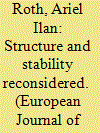

|
|
|
|
|
| Publication |
2011.
|
| Summary/Abstract |
The argument that multipolar international systems are less stable because certain states have an incentive to externalize the costs of defense to other states has been built on interpretations of the behavior of France, Russia, and especially Great Britain between the two World Wars. This article addresses flaws in both the use of the French and Russian cases, but is most tightly focused on the British case, which was the strongest, prima facie, of the three. This article demonstrates how the British scheme for defense against Germany was not a policy of attempted externalization on either the political or military level. Consequently, the long debate over the relationship between systemic structure and systemic stability, which has been heavily influenced by the belief in the existence of an incentive to externalize defense costs under multipolarity, must be re-examined, with new tests run and new conclusions explored.
|
|
|
|
|
|
|
|
|
|
|
|
|
|
|
|
| 11 |
ID:
092040
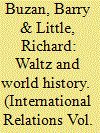

|
|
|
|
|
| Publication |
2009.
|
| Summary/Abstract |
This article provides a critique of Waltz's work from the perspective of world history. It shows how Waltz's commitment to a highly parsimonious theoretical approach paradoxically both sets up the possibility of his theory being universally applicable, and undermines its prospects as a viable approach to understanding world history. Using the key concepts from Waltz's work - units, systems, structure, process - we show the detailed grounds on which his theory fails to apply to such large swathes of time and place, so that its claims to universality fall, even though it can usefully be applied to some times and places. We also show its shortcomings in relation to the essential historical task of periodization. We argue that international relations needs to engage more with world history, and that the task of doing so will fall to approaches other than Waltz's.
|
|
|
|
|
|
|
|
|
|
|
|
|
|
|
|
|
|
|
|
|